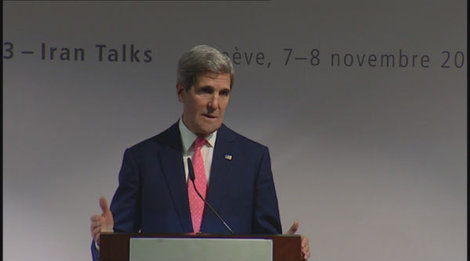IN THE MEDIA
Pause for a rethink will help West
November 13, 2013 | Colin Rubenstein

Colin Rubenstein
THE AUSTRALIAN – NOVEMBER 13, 2013
US Secretary of State John Kerry and his colleagues among the P5+1 powers who are involved in nuclear negotiations with Iran are in full agreement: striking a bad deal in an attempt to curb Iran’s illegal nuclear program would be worse than making no deal at all.
This certainly applies to interim deals reportedly discussed in Geneva last week as much as for a final settlement. The current pause until talks resume next Wednesday offers a golden opportunity for the P5+1 to reassess their latest offer, and it’s imperative that they do so, because the interim deal discussed last week appears to have been a bad one.
This is because the kind of interim deal reportedly discussed last week – surrendering crucial bargaining chips like hard-fought economic sanctions in exchange for a “freeze” in Iran’s nuclear activity – not only dilutes the West’s bargaining power but sets up a trajectory which, from reports, would ultimately allow Iran to hold on to its crucial nuclear development assets. The end result would leave Iran with more than one option for a breakout to a nuclear arsenal.
The softening of the P5+1’s negotiating position did not happen overnight, but rather is part of a trend. In the previous round of talks last month, Iran created a definite international diplomatic buzz when it brought new proposals to the table.
While the concessions Iran suggested were valueless in terms of ending the nuclear program, they were greeted by optimists as more evidence of an attitude shift, which began with the election of Hassan Rowhani as President in June.
Since the election of Rowhani, Western countries led by the US have renewed their investment in diplomacy to test Iranian intentions, but have wisely kept their sanctions regime against Iran fully intact, and reinforced their avowal to leave all options on the table – including the military option – should diplomacy fail.
Yet the reported proposals under discussion at Geneva appear to be a retreat from this sensible attitude. They would see a pause in the nuclear program, but leave Iran with the capability at any time to expel the inspectors, reactivate high-level enrichment and build a nuclear device in a matter of weeks. By timing such a move carefully, Iran would stand an excellent chance of crossing the threshold to nuclear weapons capability before the international community could react. Indeed, Iran’s proposal may be simply an attempt to replicate the North Korean playbook, whereby Pyongyang successfully zig-zagged its way to a nuclear weapon in 2006 through a series of agreements in which they ostensibly pledged to dismantle their nuclear program.
Yet as worrisome as a nuclear-armed North Korea has been for the Asia-Pacific region, the dangers posed by a nuclear Iran would be immeasurably worse.
Iran would spark nuclear proliferation throughout the Middle East, as Sunni powers such as Saudi Arabia, Turkey and Egypt scramble to offset Iran’s advantage. In addition, Iran, because of its location, has the potential and the ambition to control the Persian Gulf and Caspian Basin oil regions, which hold most of the world’s reserves.
Finally, a nuclear Iran would embolden the regime’s already extensive infrastructure and sponsorship of global terrorism.
So what would constitute a bad deal, which everyone agrees would be worse than no deal? It would be any agreement that does not substantially turn back the clock on Iran’s timeline towards nuclear weapons capability.
A good deal would remove the majority of Iran’s large enriched uranium stockpile, dismantle at least most of the vast enrichment capacity they have developed to swiftly convert that stockpile into bomb fuel, and end plans to start up the plutonium-producing Arak heavy water reactor.
A good deal would mean unrestricted access by nuclear inspectors to any Iranian facility, at any time, to verify compliance and potent and immediate consequences for non-compliance. Further, the P5+1 must demand from Iran – as a veteran flouter of clear legal obligations with a long history of deliberating using negotiations merely to buy time – only concessions of lasting value before considering any significant easing of sanctions.
Finally, an extended process of “confidence building” whereby sanctions are gradually lifted in exchange for small and easily reversed concessions from Iran – such as the suspension of the enrichment of uranium to medium levels – is a recipe for failure. First, because there is no time for any such drawn-out process given how close Iran is to a situation where it can break out and produce nuclear weapons before they can be detected. And second, because almost all experts agree that if the sanctions are fully or partially lifted, it will be extremely difficult and time-consuming to gain the international consensus needed to reimpose them if necessary.
The interim deal proposed appears to lift some sanctions for no more than a partial pause in Iran’s drive to nuclear weapons – with no effort to reduce Iran’s enriched uranium stockpiles or enrichment capabilities.
At the 11th hour, as Iran stands poised on the cusp of nuclear weapons capability, any margin for error by negotiators is razor thin. They must err on the side of caution and reject any deal that doesn’t actually provide direct assurances that Iran’s nuclear weapons capability will be dismantled.
Colin Rubenstein is executive director of the Australia/Israel & Jewish Affairs Council
– See more at: http://www.theaustralian.com.au/news/world/pause-for-a-rethink-will-help-west/story-e6frg6ux-1226758491103#sthash.KAUKvyU4.dpuf
Tags: International Security





